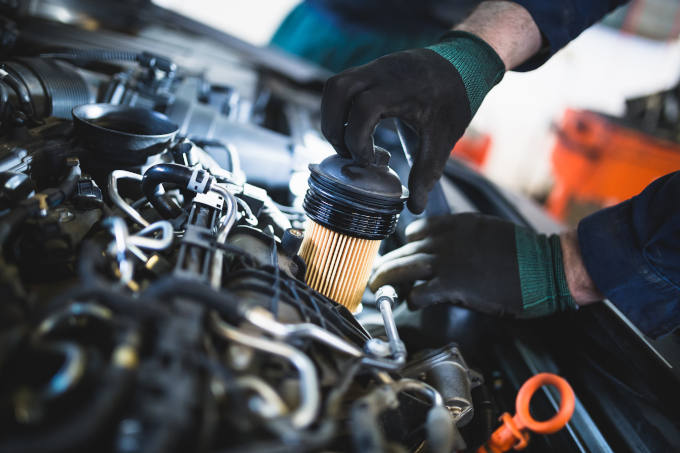Every time you climb inside your vehicle and start the ignition, powerful chemical reactions occur to give you the power to head down the road. However, these reactions can create potent fumes, exhaust, and liquid mixtures that must be moved through and out of the vehicle to protect its various parts and overall health and performance. Vital components that aid in this process are your different vehicle filters.
What Are Vehicle Filters, and What Do They Do?
There are seven different filters and devices in a modern vehicle that are involved in the movement of gases and liquids through parts of your vehicle. Learning more about each filter's function can give you a better understanding of their purpose and how the proper maintenance and replacement of your filters can help your vehicle function at its full potential.
Cabin Air Filter
The cabin air filter ensures that the air coming in and out of your vehicle's cabin is clean and flowing. Modern cabin air filters will even capture exhaust gasses and other harmful odors from outside the car, keeping your cabin air fresh and clean no matter the season.
Located near or under the dashboard, you will quickly notice if your cabin filter is dirty or blocked as the flow begins to feel strained or the air quality noticeably goes down. For those with respiratory problems or who suffer from allergies, dirty cabin filters can cause difficulty breathing, headaches, or other discomforts even when using the air conditioner or heater. If you notice your cabin air quality worsening or the flow of air slowing, it may be time to replace this filter.
Oil Filter
Your vehicle's oil filter is vital to ensuring that your oil flow remains consistent throughout the car. A clean oil filter helps keep harmful particles from mixing and potentially damaging your vehicle’s parts lubricated by oil. When clear and functioning correctly, a car oil filter will help purify the oil as it moves through the vehicle.
Each oil filter can function for the length of your vehicle's specific oil change. If your oil filter is not clean or working correctly, a breakdown of the oil’s lubricating properties and a buildup of sludge within the vehicle’s engine can occur. Symptoms of a dirty oil filter can include overheating, poor performance and lack of power, low oil pressure (check your dashboard), metallic sounds coming from your engine from metal against metal, sputtering, or filthy exhaust coming out of the tailpipe. Changing your oil filter at each recommended oil change ensures it is doing its job at full capacity and helping to prevent unnecessary repairs.
Engine Air Filter
One of the standard filters that is replaced during routine maintenance, engine air filters help provide the clean oxygen needed to power the engine. Your vehicle's engine air filter will help prevent particulate matter from reaching and damaging your engine — including insects, dust, particles, sand, or other debris.
Engine filters come in various shapes, usually circular or cylindrical panels. They help your vehicle's engine performance, power, and fuel consumption. If you notice a reduction in your vehicle's power, fuel mileage, or engine performance, it may be time to replace your engine air filter.
Fuel Filter
The fuel that keeps your vehicle’s engine running is specifically manufactured to provide clean and adequate power to your vehicle. If contaminants enter into your fuel, it can damage fuel injectors, cause stalling, reduce power, or render your vehicle inoperable. By keeping your fuel filter changed regularly, you can help your vehicle use fuel effectively and efficiently, helping save money at the pump.
Transmission Filter
Your transmission filter is located just above the transmission oil pan and helps collect and prevent debris and contaminants from reaching your transmission fluid that could potentially damage your transmission. As your car ages and bits of metal or other debris begins to break away from parts of the vehicle, the transmission filter can catch and prevent them from mixing with the transmission fluid. If you start experiencing transmission issues, such as slipping, delayed engagement, difficulty shifting gears or strange noises or smells, be sure to have an expert technician that specializes in transmission repair investigate.
PCV Valve & Breather Element
As one of your vehicle's smallest and most unassuming parts, the Positive Crankcase Ventilation (PCV) Valve and the Breather Element work together to ensure that your vehicle's crankcase pressure and emissions are reduced created by engine combustion. Without keeping your PCV Valve and Breather elements clean, you may experience engine trouble, rough idling, and performance concerns Your car manual gives guidance on how often to change and maintain these critical pieces of your vehicle's ventilation and filtration system.
Tips for Preventing Dirty Filter Damage
As you can see, the various filters located throughout your vehicle play an essential role in ensuring that each vehicle system operates at its full potential. By keeping harmful particulate matter and other contaminants from moving through the car, you can prolong your vehicle’s life by protecting its health and safety.
Read Your Owner’s Manual
Each vehicle comes with a manufacturer manual that gives guidance on each filter’s type, location, and replacement schedule in your vehicle. By taking the time to read through your owner’s manual and taking note of the various car filter instructions, you can help keep your filters clean and avoid problems down the road.
Maintain A Routine Inspection & Maintenance Schedule
Make sure that you keep to the vehicle manufacturer's recommended maintenance and inspection frequency. A trained technician can help you spot unnoticed issues related to your car filters and help you replace them as needed. Most times, trusting the advice and guidance of a trained technician can help you handle most of your car filter needs without a second thought.
Protect Your Filter & Enjoy Your Ride
Car, SUV, and truck filters are small pieces of your vehicle that play a huge role in extending your vehicle's life. Dirty, worn out filters can not only lower your car's efficiency, but prolonged filter issues can lead to extensive damage, costly problems, and repairs. By learning more about your vehicle's specific filters, you can begin to practice a consistent replacement routine to keep you on the road longer and stronger.
We're Here to Help
AAMCO has more than 60 years of experience diagnosing, servicing, and repairing more than 20 million vehicles. Customers rely on us for:
- Quality workmanship
- Expert Technicians
- Superior service
- Best warranty coverage available
- Trustworthy, honest service
AAMCO Centers of Southern California and surrounding areas represent trust, quality, and value. Call us today!

 Schedule Appointment
Schedule Appointment















